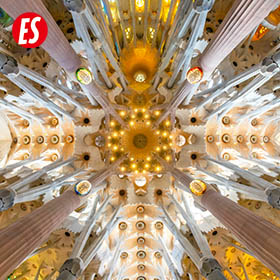
Located on the beautiful Mediterranean coast, Barcelona is the capital of Catalonia, Spain. Architects such as Antoni Gaudí and Lluís Domènech i Montaner brought artistic masterpieces such as The Basílica de la Sagrada Família and the Casa Milà to Barcelona. In 1992, the Olympic Games were held in Barcelona, for the first time in the history of Spain.
God’s Architect – Gaudi
The 19th and 20th centuries saw the birth of many famous modernist architects in Barcelona, and Antoni Gaudí was undoubtedly the most famous one. Some called him a genius, others disdained him. Gaudí left us outstanding works of art such as the Casa Milà (La Pedrera), the Palau Güell and the Park Güell. Seven buildings designed by him have been declared World Heritage Sites, including the legendary Basílica de la Sagrada Família (Basilica of the Holy Family), which is still unfinished.

Basilica Of The Sagrada Familia
A Masterpiece of Gaudi's Life's Work
The Basílica de la Sagrada Família, is the work of the architect Antoni Gaudi. According to his design, the cathedral should have a Nativity facade, a Passion facade, a Glory facade, and 18 spires. It is the only World Heritage site under construction.

Casa Mila / La Pedrera
Modernist Building Before Its Time
Designed by architect Antoni Gaudí in 1906, Casa Milà is a private residence with a wavy stone facade and four apartments on each floor. The extremely creative patios, attic, and roof terraces of Casa Milà show Gaudí's ingenuity beyond his time.

Palau Guell
Gaudi's Modernisme Early Work
The Palau Güell, the private residence of Catalan industrialist Güell, was designed and built by Gaudí in 1886. It was an early testing ground for Gaudí's innovative attempts, with elements of steel, glass, and mosaic being inherited by his later works.

Park Guell
City Park of Catalan Modernism
Located in the northern part of Barcelona, Park Güell offers a high view of the Mediterranean Sea and the city. Once part of a commercial and residential project, it features the Gaudi-designed colored mosaic Dragon Stairway and the Hypostyle Room, as well as the Gaudi House Museum.

Gaudi House Museum
The Last Years of Gaudi
The Gaudi House Museum is a red house in Barcelona's Park Güell that was built as a model home for the residential project where Gaudi spent the last 20 years of his life. The museum showcases Gaudi's simple bedroom, as well as numerous pieces of furniture and objects designed by him.
1992 Summer Olympics, Barcelona
As he former President of the Olympic Committee, Mr. Samaranch said, it was “the most successful Olympic Games ever”. The moment when the Spanish archer lit the Olympic Torch with a flaming arrow in the opening ceremony is still fresh in our minds. You can visit Anella Olimpica de Montjuic in Barcelona, which preserved several venues of the 1992 Olympic Games. The port and streets of the Mediterranean coast have been reborn with the arrival of the Olympic Games, too.

Anella Olimpica de Montjuic
The 1992 Olympic Games Barcelona
In 1992, Spain successfully held the 1992 Summer Olympics in Barcelona, Catalonia. The Anella Olímpica is located at the top of Montjuïc Hill, with facilities such as the Olympic Stadium, the Palau Sant Jordi, and the Montjuïc Communications Tower. After the Olympic Games, it was opened to the public as an Olympic Park Barcelona.

Port Olimpic And Beach In Barcelona
The Great Olympic Renovation
Barcelona has a beautiful coastline and sandy beaches, with the Port Olimpic and a 5 km stretch of beaches that illustrate the Mediterranean charm. This stretch of coast was developed for the 1992 Olympic Games and has become the most important commercial and leisure area on the seafront of Barcelona.

































